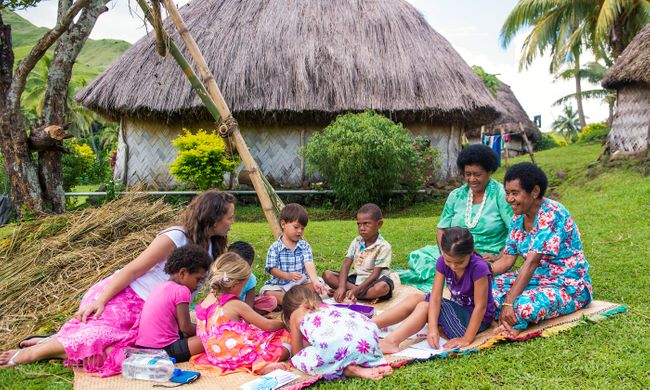As a South Pacific nation facing the challenges of climate change – and being increasingly vocal in demanding increased action from the world's richest countries – Fiji has long understood the importance of the environment when it comes to its tourism industry.
Fijian resorts are world leaders when it comes to operating sustainably. For example, on Kadavu and many other islands, resorts operate almost entirely off-grid, generating their own electricity and using permaculture techniques to grown their own food – all while offering the highest standards of service for visitors.
From community and environmental tourism to getting involved with volunteering, here are some more pioneers of sustainable tourism in Fiji.
A visit to a Fijian pearl farm provides proof that this most luxurious of jewellery goes hand in hand with sustainable business practices and marine conservation. Fiji's pearl industry consists of small family-run farms based mainly around Savusavu on the island of Vanua Levu.
Pearl oysters, which are filter feeders, are a good barometer of sea quality. Tours from Savusavu give the chance to see the hatcheries, as well as a local giant clam reserve, and learn how farming techniques preserve not just wild oyster stocks but also help wider coral reef conservation. Its possible to snorkel among the ropes of growing oysters and, twice a year in April/May and October/November see both ends of the farming process, from the intricate work of seeding the pearls to harvesting the fully-grown oysters.
It's a truism that tourism works best when it is rooted in its host communities. Viti Levu-based Talanoa Treks understand this, and have spent years partnering with host villages across the island to offer the best in hiking and village tourism. Small group treks are led through dramatic hills and forests of the island's interior, including a chance to hike up Mt Tomanivi, Fiji's highest mountain, as part of their unique 'Three Peak Challenge'.
Hiking is only part of the tour however, as guides are chosen from four host villages, who work with Talanoa to invite visitors into their communities as equals for genuine cultural exchanges.
One of Fiji's most active conservation organisations is the Mamanuca Environment Society (MES), founded by a consortium of local resorts to encourage protection of the island environment. Visitors to the Mamanucas are encouraged to get involved. The NGO runs reef check surveys and turtle conservation programmes, both of which accept volunteers. Divers can get further involved in reef conservation, from coral transplanting to helping remove the invasive crown-of-thorns starfish.
In addition to this, MES runs environmental and waste management awareness programmes at resorts and in local communities. They also run a dry forest restoration project, while its water analysis project continues to provide scientific data on the health of the sea that the villages, resorts and fishing communities all depend on.
Based out of the Yasawa islands group, Vinaka Fiji is one of the country's main volunteering organisations, working in the 27 villages that make up this under-developed part of the country.
There are a wide variety of community development programmes to potentially get involved in, from working alongside villagers with projects that tackle the perennial shortage of fresh water on the islands, to permaculture and support for village cooperatives and microbusiness development. Scuba divers can also join marine conservation projects run with partner organisations.
Those with teaching experience and more time to give can also volunteer in local schools, in a partnership programme run in coordination with the Yasawas council, either teaching directly or – even better – helping to train up more teachers from the local communities.
Fiji has the third largest extent of mangroves in the Pacific region but these important ecosystems are under continuous threat. They serve both as fish nurseries as well as coastal protection against increasingly turbulent climate change-driven weather systems.
On several islands, local environmental organisations and resorts have partnered to help restore these important wetlands. On Viti Levu's southern coast, the Auberge Nanuku has its own mangrove nursery, overseen by the resort's resident marine biologist. Guests are encouraged to get involved with planting. At Barefoot Manta in the Yasawas, another nursery raises juvenile plants as part of a shoreline restoration project. The resort also has coral planting beds, as well as reintroducing giant clams to improve reef health offshore. Volunteers are welcome on all these projects.








